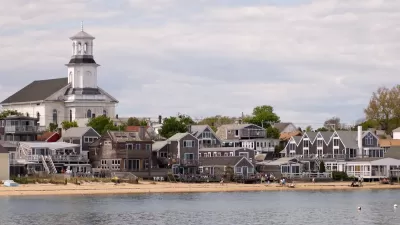While some agree that the plan has financial merit, others fear the social costs of mixing incomes in public housing neighborhoods. The authority's chairman sees it as a win-win.
Batya Ungar-Sargon discussed the details that have begun to emerge about the New York City Housing Authority's (NYCHA) controversial plan to allow private developers to build on "under-used" land at public housing sites located in "prime real estate areas," such as the Upper East and West Sides and the Lower East Side.
"The proposal will use the citywide 421a housing subsidy, which means that in exchange for 20-year property tax abatements, developers will set aside 20 percent of the new units for affordable housing. 'Affordable' means that the apartments will be made available to families who earn up to 60 percent of the regional Area Median Income (or $49,800 for a family of four), while the other 80 percent will charge market-rate rents."
"'If all sites currently under consideration are offered and attract acceptable bids, 4,000 to 4,500 apartments could be created,' Sheila Stainback, NYCHA's spokeswoman, writes in an email. Parking lots will be the most common spot for the new buildings to be erected. 'NYCHA will work closely with residents to restore green space in other parts of the developments and to replace parking,' Stainback writes."
"However, some advocates and experts think the arrangement NYCHA has described is not a good enough deal for land in such high demand, especially given the tax break that's involved. 'That is the tax deal given to developers on private land,' says Eliot Sclar, Director of the Center for Sustainable Urban Development (CSUD) at Columbia University's Earth Institute. 'In this case, they are privatizing public resources; they should leverage it much more,' Sclar adds."
"Others are worried not about the financials as much as the initiative's impact on public housing. Judith Goldiner, attorney-in-charge at the Legal Aid Society's Civil Law Reform Unit, says that public housing was built to be dense, with vacant space to compensate. Building on that vacant land would mean a compromise in quality of life. She also fears that the federal government might adjust its funding to reflect NYCHA's new lease income."
FULL STORY: Details Emerge About Plan for Private Buildings on NYCHA Land

Alabama: Trump Terminates Settlements for Black Communities Harmed By Raw Sewage
Trump deemed the landmark civil rights agreement “illegal DEI and environmental justice policy.”

Study: Maui’s Plan to Convert Vacation Rentals to Long-Term Housing Could Cause Nearly $1 Billion Economic Loss
The plan would reduce visitor accommodation by 25% resulting in 1,900 jobs lost.

Planetizen Federal Action Tracker
A weekly monitor of how Trump’s orders and actions are impacting planners and planning in America.

Wind Energy on the Rise Despite Federal Policy Reversal
The Trump administration is revoking federal support for renewable energy, but demand for new projects continues unabated.

Passengers Flock to Caltrain After Electrification
The new electric trains are running faster and more reliably, leading to strong ridership growth on the Bay Area rail system.

Texas Churches Rally Behind ‘Yes in God’s Back Yard’ Legislation
Religious leaders want the state to reduce zoning regulations to streamline leasing church-owned land to housing developers.
Urban Design for Planners 1: Software Tools
This six-course series explores essential urban design concepts using open source software and equips planners with the tools they need to participate fully in the urban design process.
Planning for Universal Design
Learn the tools for implementing Universal Design in planning regulations.
Caltrans
Smith Gee Studio
Institute for Housing and Urban Development Studies (IHS)
City of Grandview
Harvard GSD Executive Education
Toledo-Lucas County Plan Commissions
Salt Lake City
NYU Wagner Graduate School of Public Service




























